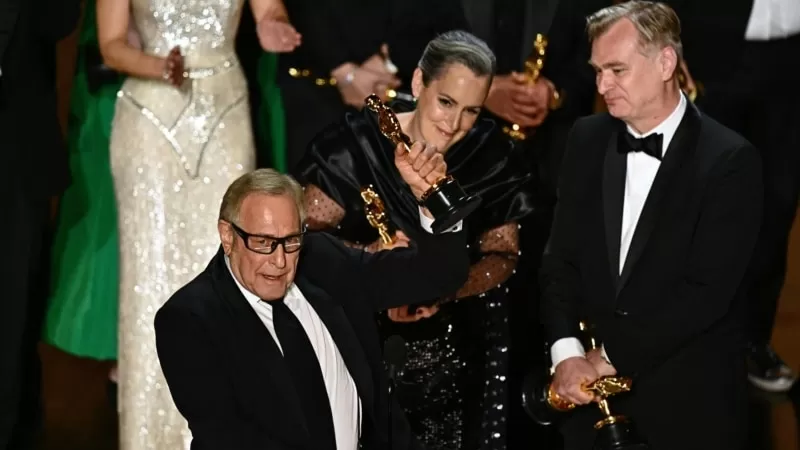Los Angeles – “Oppenheimer,” a solemn three-hour biopic that became an unlikely billion-dollar box-office sensation, was crowned best picture at the 96th Academy Awards, solidifying Christopher Nolan as one of Hollywood’s foremost big-screen auteurs.
After years of being passed over by the Oscars, Nolan finally received the recognition he deserved with seven awards for “Oppenheimer,” including best actor for Cillian Murphy, best supporting actor for Robert Downey Jr., and best director for Nolan.
The Academy of Motion Pictures Arts and Sciences made history by awarding its top prize to a widely seen, big-budget studio film for the first time in over a decade. “Oppenheimer” brought in droves of moviegoers with its complex and thought-provoking drama about J. Robert Oppenheimer and the creation of the atomic bomb.
In his acceptance speech, Murphy dedicated the award to the peacemakers and acknowledged the impact that Oppenheimer’s actions have had on the world. “For better or worse, we’re all living in Robert Oppenheimer’s world,” he said.
“Oppenheimer” also emerged as a fittingly foreboding film for the current times, with conflicts and wars raging in Gaza and Ukraine, and a potentially momentous U.S. election on the horizon.
The most highly anticipated award of the night, best actress, went to Emma Stone for her role as Bella Baxter in “Poor Things.” Stone beat out Lily Gladstone of “Killers of the Flower Moon,” who would have been the first Native American to win an Academy Award.
Stone’s win confirmed her as one of the preeminent actresses of her generation, joining the ranks of illustrious women who have won best actress two or more times, such as Katherine Hepburn, Frances McDormand, Ingrid Bergman, and Bette Davis.
In his acceptance speech, Nolan noted that cinema is just over a hundred years old and expressed his gratitude for being a part of it. “We don’t know where this incredible journey is going from here, but to think that I’m a meaningful part of it means the world to me,” he said.
The Academy Awards were not without their share of protest and politics, as demonstrations for Gaza took place outside the Dolby Theatre in Los Angeles. The awards also recognized films that shed light on current global conflicts, such as “The Zone of Interest” and “20 Days in Mariupol.”
Despite the serious undertones of the evening, there was still plenty of razzle-dazzle and Hollywood glamour. The ceremony was hosted by Jimmy Kimmel and featured a star-studded performance of the “Barbie” hit “I’m Just Ken” by Ryan Gosling, with a surprise appearance by Slash on guitar.
The big winner of the night was “Oppenheimer,” which dominated the awards with its stunning cinematography, editing, score, and Robert Downey Jr.’s supporting performance. Downey, who had been nominated twice before, finally took home his first Oscar, solidifying his comeback in Hollywood.
In his acceptance speech, Downey humorously thanked his “terrible childhood” and the academy, in that order. He is the son of filmmaker Robert Downey Sr.
“Barbie,” last year’s biggest box-office hit with over $1.4 billion in ticket sales, did not win an award until almost three hours into the ceremony. It took home the award for best song, with Billie Eilish and Finneas’ “What Was I Made For?” beating out “Barbie” co-star Ryan Gosling’s performance of “I’m Just Ken.”
The war in Gaza and the ongoing conflict in Ukraine were on the minds of many attendees, with some protesters shouting “Shame!” at those trying to reach the awards. Jonathan Glazer, the British filmmaker behind “The Zone of Interest,” made connections between the dehumanization depicted in his film and current events.
“Right now, we stand here as men who refute their Jewishness and the Holocaust being hijacked by an occupation which has led to conflict for so many innocent people,” he said. “This dehumanization, how do we resist?”
The awards also recognized the first Oscar win in Ukrainian history, with Mstyslav Chernov’s “20 Days in Mariupol,” a harrowing chronicle of the early days of Russia’s invasion of Ukraine, winning best documentary. The film






